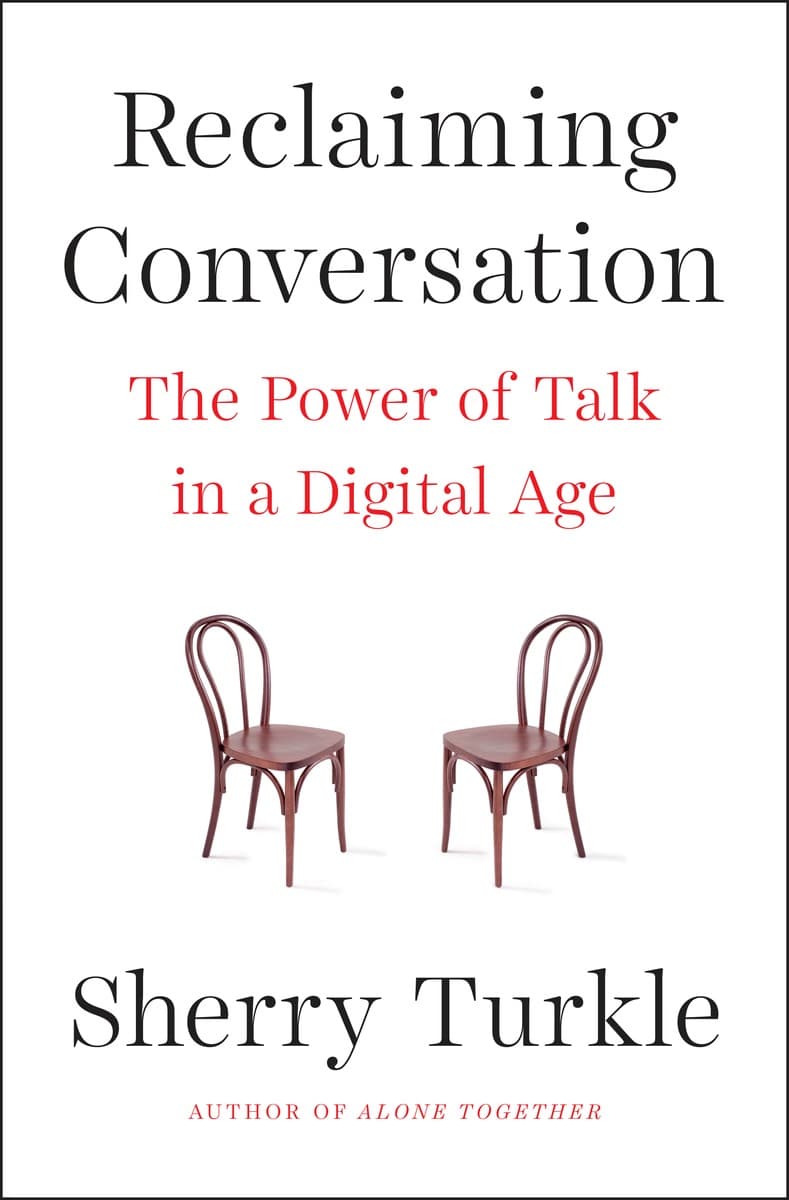Advertisement
Sherry Turkle Is Done With Screens, She Wants To Be 'Reclaiming Conversation'
“Face-to-face conversation is the most human — and humanizing — thing we do. … It’s where we develop the capacity for empathy. It’s where we experience the joy of being heard, of being understood.”
So says Sherry Turkle in “Reclaiming Conversation: The Power of Talk in a Digital Age,” and this view is at the heart of her newest study of technology and culture.

Drawing on numerous studies and from her own interviews with teachers, parents and students, “Reclaiming Conversation” makes a convincing case that our ability to electronically connect with anyone, anytime, is sabotaging our relationships with those right next to us. Her solution, outlined in how-to steps at the end of the book, is to pull away from the screen long enough to allow ourselves to fully engage in the often unpredictable art of real-time talk.
These days, intrusive smartphone behavior is hardly breaking news. In fact, it’s been a high-profile irritant since the beginning of the century.
In the 2006 movie “The Devil Wears Prada,” Anne Hathaway’s endlessly chiming smartphone is as vital to the story as the high-fashion clothes she wears to work. The cover of the Nov. 2, 2009 New Yorker famously showed a neighborhood street on Halloween, with costumed kids reaching up to ring doorbells… and all parents on the sidewalk staring down at their phones.
Since you can easily find articles on distraction, interruptions, the pitfalls of social media for kids — do we need a book on conversation? Well, no and yes. No, because so many cautionary articles do already exist. Yes, because of the approach that Turkle takes. She makes solitude and spoken conversation, not the evils of devices, the hub of her argument. All examples and interviews logically circle back to this core point: You need both fundamentals to fully know yourself and your relationships.
Turkle approaches this topic with more context than most. A professor of the Social Studies of Science and Technology at MIT, she is also the founder and director of the MIT Initiative on Technology and Self. Her books on the subject stretch as far back as 1984, with her book “The Second Self: Computers and the Human Spirit.”
“Reclaiming Conversation” is, in Turkle’s words, a “call to action.” She sees damage, all fixable, to three pillars of humanity highlighted in “Walden” by that master of non-distraction, Henry David Thoreau: solitude (self-reflection), friendship (empathy) and society (mentorship, in families and education).
Turkle cautions that if we allow our screens to deprive us of solitude, of genuine uninterrupted time, we cannot “construct a stable sense of self.” This is bad enough for adults, but for kids, it becomes more difficult to develop resiliency or creativity. She describes a teenage girl who once wrote in her journal every night, enjoying the process of exploring her own thoughts and feelings. After she joined Facebook, she stopped journal writing to broadcast curated updates on her life.
From talks with students of all ages, Turkle concludes that our phones, with their modes of sending and receiving, alter the nature of friendship, making it more superficial and “transactional.” One young man interviewed, now in college, views the highly competitive high school culture as one of “’zero tolerance’ for making mistakes,” which filters into social encounters. Why risk the vagaries of real-time conversation when you can craft a witty text? And yet, a texted conversation also leaves a permanent record, which adds additional performance stress.
The focus of “Reclaiming Conversation” goes well beyond phone use into all kinds of screen time. Sometimes this expansiveness works, and sometimes it doesn’t. Topics like multitasking and the silo effect of online media feel a little worn out. Some statements are too sweeping, such as asserting that the modern office is a place where people talk only by email or instant messaging, but a few pages later, pronouncing a trend toward more in-person work meetings.
Turkle is spot on as she describes a life enhanced by screen time as “both gratifying and alienating.” A picture emerges of “a sense of friendship” rather than a reliable friendship, of high school friends sleeping near their phones to be “on call” for each other like ER doctors, but when together, “tempted to be with each other but also elsewhere.” The dilemma of endless social possibilities carries through to early adulthood with dating apps like Tinder. As one 20-something mused, “When people are just a click away, it is tempting to never settle.”
Turkle also affirms what many other works have noted: Kids immersed in social media are less able to feel empathy. They consider comments that they post, which they’d never utter in person, “a kind of cruelty that doesn’t count.” But of course, it does.

“Reclaiming Conversation” paints an equally worrisome portrait of adult priorities. In an extreme example, there is the divorced father who looked forward to time with his daughter as chaperone of her school field trip, but spent much of the day posting pictures of their trip and responding to comments.
In the best circumstances, home is a “protected circle” where a child can talk to caring listeners, and learn how to listen to others. Constant interruptions erode this trust, with often catastrophic consequences. A parent checking a phone at dinner diminishes a vital connection into a mere exchange of information — but children can get information anywhere.
If this is the new conversation, Turkle notes “it is not doing the work of the old conversation” at home, work or school. Teachers fret that their students struggle with basic skills of listening to each other and taking turns to talk. But many schools issue iPads for all reading assignments, which ratchets up the level of distraction.
Like any age, this one also has hierarchies. It used to be simply those with tech devices and those without. Now, Turkle explains there are also those with tech devices and those who attend device-free retreats. This relatively new phenomenon raises the question of where we are on this device/conversation continuum.
Does “Reclaiming Conversation” warn of a problem already on the way to solving itself? Or will the digital divide widen, allowing only those with enough time and money the freedom to balance their lives and technology?
In a world where we are “forever elsewhere,” “Reclaiming Conversation” offers a timely reminder that the greatest gift you can give your friend, your partner, your child, yourself, is to be fully present.